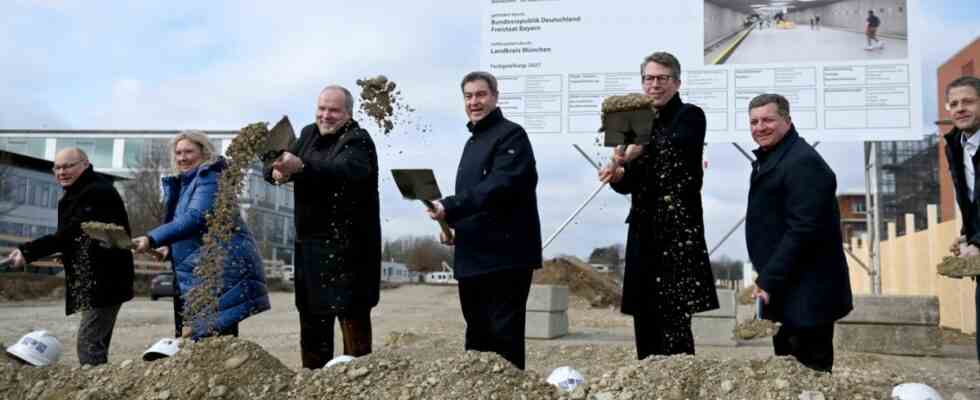Students and scientists at the Munich university site in Martinsried can count on finally being able to reach their lecture halls, laboratories and other research facilities by subway in a few years. 32 years after the first serious considerations for an extension of the U 6 from the Großhadern Clinic to the then still manageable science campus in the Planegger district, the symbolic groundbreaking for the 212 million euro and around 950 meter long construction project took place on Monday – on a huge Construction site between the medical center of the Ludwigs-Maximilians-Universität (LMU) and the buildings of the innovation and start-up center IZB. The actual construction started in November.
Because the subway extension is a prestige project of the Bavarian state government, two ministers, led by the Prime Minister himself, were on the construction site. “Our shortest but most important subway line is being built here,” said Markus Söder (CSU) at the ceremony. From 2027, the U 6 will connect the two research centers in Garching and Martinsried, i.e. in the north and west of the city. The Martinsried science campus is one of the three largest in Europe. The Free State of Bavaria alone has funded it with more than 500 million euros since it was founded. If you include the current projects of the Max Planck Institutes located here, the figure is more than one billion euros.
On Monday, Söder predicted “a huge leap” for the institutes and universities in Martinsried and Großhadern. The future belongs to science. The Bio-Campus will continue to prove itself as a “training ground for Nobel Prize winners”. The connection to Munich’s rapid transit network corresponds exactly to Bavaria’s policy, “because we are on the side of local public transport”. Söder took the opportunity to refer to the announcement by the CSU that, in addition to the 49-euro ticket, they want to introduce a Bavarian version for students, schoolchildren and trainees for the price of 29 euros for the winter semester.
Transport Minister Christian Bernreiter (CSU) called Martinsried “a synonym for the future”. Bavaria is proud to be able to take over a significant part of the construction costs with 77 million euros “in favor of the attractiveness of the public transport and the science location Munich”. Science Minister Markus Blume (CSU) spoke of a “line from excellence to excellence”. It is a “central stepping stone for the future of the research market in and around Munich and the entire high-tech state of Bavaria. This is one of the best that Germany has to offer.”
The aisle for the extension of the subway can already be seen, because the actual construction started in November.
(Photo: Stephan Rumpf)
District administrator Christoph Göbel (CSU), who sees an “increase in the importance of the Munich district as a science location”, made a similar statement. The new route takes account of the persistently large number of urban commuters. “A great investment in the future of the municipality, the district and the Free State.” Planegg’s Mayor Hermann Nafziger (CSU) – he was involved in most decisions about the subway in his previous capacity as a municipal councilor – modified the well-known saying and said: “What takes a long time will be really good.”
Seven men and one woman were then allowed to put on the safety helmet and pick up the spade specially prepared for them: In addition to Söder, Nafziger, Göbel and the two ministers, Dimitri Steinke, Managing Director of the project management company PMG, contractor Leonard Weiß and the member of parliament Kerstin Schreyer (CSU).
Teachers and students of the Planegger music school accompany the ceremony.
(Photo: Stephan Rumpf)
In the midst of the crowd of invited guests from science and politics were also the “veterans” from Planegger local politics, who sometimes desperately accompanied the difficult path to the first groundbreaking for more than 30 years: the former mayors Ulrike Höfer, Dieter Friedmann, Heinrich Hofmann and Peter Stokers, plus a number of local councillors. Ulrike Höfer, during whose time the municipal council had set the decisive course, sighed at the huge mounds of earth on the construction site: “That I can still experience that.”

